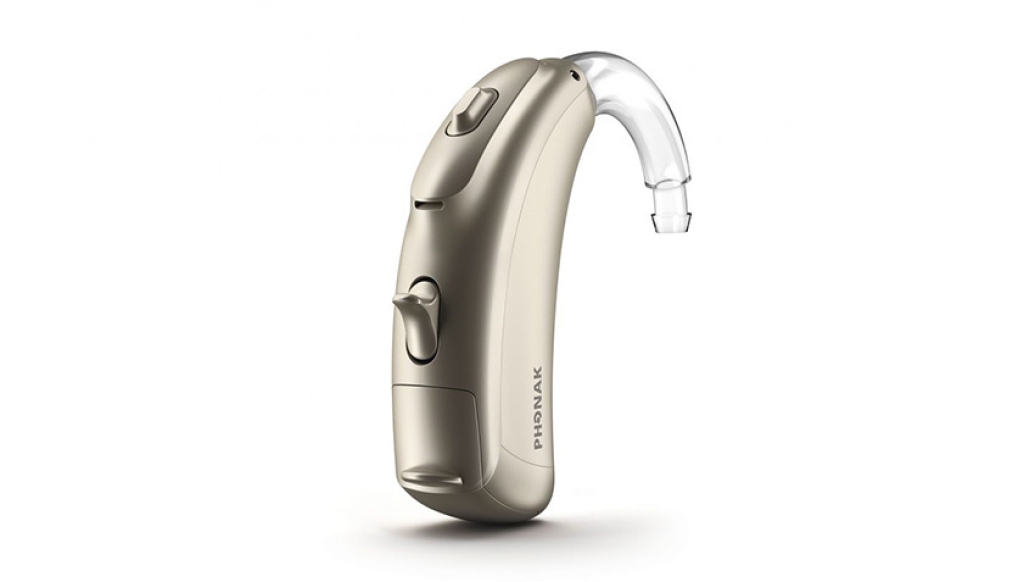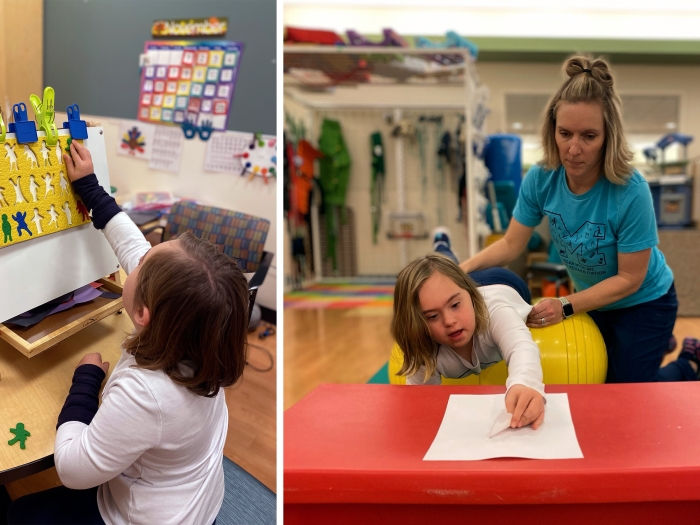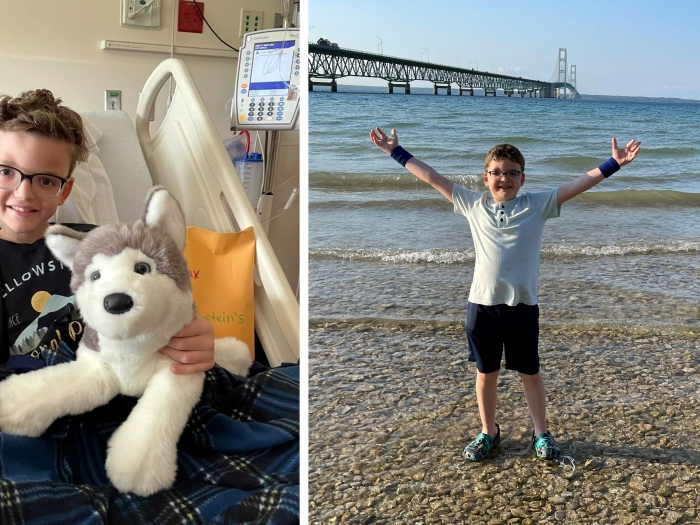A Michigan Medicine team brings hearing health services to an underserved population.
8:59 PM
Author |

When it comes to improving access to health care, field clinics certainly pull their weight. These mobile hotspots directly remove barriers to medical care for individuals who live in rural areas and cannot easily reach subspecialty care.
"In the field clinic model, a provider travels to a rural or distant area of Michigan to provide subspecialty exams, evaluations and treatments for a specific medical condition," says Kristy Winters, AuD, an audiologist at Michigan Medicine's Pediatric Otolaryngology Audiology Clinic at C. S. Mott Children's Hospital.
In 2019, Winters and her colleagues noticed that a large group of parents within an Amish community in Branch County started seeking treatment for their children's hearing loss and ear infections.
"We started to recognize a pattern of hearing loss within and across these families, but several roadblocks were preventing us from examining things further," says Winters. "For example, Amish families tend to be fairly large and travel by horse and buggy. So, it was difficult to coordinate transportation for each family's siblings to be evaluated together. The cost of transportation from Branch County is remarkably high for so many trips for so many people."
Winters says that the standard model of care just didn't seem to be meeting the needs of these families, nor was it cost-effective for the state.
She adds that she and her team also learned that many of the parents within this population were concerned about certain technologies for treating hearing loss due to their cultural and religious beliefs. This, in turn, led her team to look to the field clinic model as a potential way to better serve this community.
"A team of us, including Angelique Boerst, M.A., Ruth White, AuD, Glenn Green, M.D., and the rest of the pediatric otolaryngology audiology staff, decided to explore the option of offering our services to this community in Branch County instead of Ann Arbor," says Winters. "In March of 2019, we scheduled a site visit, which was coupled with a parental Q and A session, at two of their schoolhouses."
Winters and Boerst shared information about pediatric hearing loss, as well as the importance of early intervention while the Amish parents talked about their longstanding traditions and beliefs. Together, the two groups collaborated on ideas to merge specialized hearing health care with a non-traditional community.
MORE FROM MICHIGAN: Sign up for our weekly newsletter
"Many of the parents expressed concerns about analog versus digital hearing aids," says Winters. "We realized that analog hearing aids had been accepted by the community elders many years ago, but (modern) digital hearing aids were not quite there yet."
The following month, the team returned to Branch County to conduct a free hearing screening for any families who had related concerns or wanted to ensure that their children were hearing well.
"We were joined by additional audiologists, hearing aid technicians and two nurses from the Michigan Department of Health and Human Services," says Winters. "With a couple of generators, we conducted a hearing screening at two schoolhouses. And that day, we were able to screen 52 children and a handful of parents. We identified six new cases of hearing loss and eight children that needed ENT care."
However, even though the screening day was a success, it still didn't address the issues related to the cost of transportation for care, or the availability of acceptable hearing aids to treat childhood hearing loss. So in July, the team requested a meeting with the community's bishops regarding digital hearing aids.
To date, we have provided 32 children from 11 different families with basic digital hearing aids through our clinic and in the field.
"We knew that it was important for us to have a conversation about the evolution of hearing aids – from analog to digital – with the community's most respected elders," says Winters. "During this meeting, we compared today's hearing aids to other technological advances already embraced by their community."
According to Winters, the bishops acknowledged that they were aware of other Amish communities using digital hearing aids and cochlear implants to treat hearing loss. But their established traditions and values led to spiritual concerns about the "Mark of the Beast," or being spiritually tracked by Satan through the use of these devices.
In the following months, the team led a demonstration where they disassembled an over-the-counter analog hearing aid, which was commonly used by adults within the community, as well as a recommended digital one for their children to show that they were based on similar technology.
"In addition, we informed the elders that these hearing aids would have to be digital because analog hearing aids are no longer manufactured by pediatric hearing aid companies," notes Winters.
After all the information was gathered, the team sent a summary outlining their findings to the bishops.
"To our surprise, the bishops approved the basic digital hearing aids for their children in November," says Winters. "This opened the floodgates, so to speak, as many families that had been held up by the internal debate regarding the types of hearing aids soon returned to the clinic, including some individuals first identified at the free hearing screening day."
In February of 2020, encouraged by the success of the community collaboration, the team submitted a grant proposal to the MDHHS to secure funding for a regularly scheduled field clinic.
"Our goal was to coordinate audiology care with ENT and speech-language pathology care in the field, just as we would if the family were to travel to Ann Arbor," says Winters. "We wanted to provide this community with education regarding language development and the impact of hearing loss on early language acquisition. Hearing loss may be genetic, but it may also be the result of repeated or untreated ear infections, so providing education regarding ear and/or hearing health care is important too."
In May of 2020, White was able to return to the schoolhouse to fit nine children diagnosed with hearing loss with hearing aids just before the COVID-19 pandemic hit. She also took ear impressions for five children who already had hearing aids that needed to be replaced.
And in September of that same year, their field clinic grant was finally approved by the MDHHS.
"The first official field clinic will be held in Branch County on February 3," says Winters. "Our team will include one ENT, two audiologists, one speech-language pathologist and a nurse from MDHHS. Ears will be examined, hearing will be tested, hearing aids will be fit or checked and language skills will be screened."
Like Podcasts? Add the Michigan Medicine News Break on iTunes, Google Podcast or anywhere you listen to podcasts.
The team looks forward to future collaborations with the community to ensure that care and services evolve to meet their needs over time.
"To date, we have provided 32 children from 11 different families with basic digital hearing aids through our clinic and in the field," says Winters. "We are excited about continuing our work in Branch County twice a year. It has truly been an honor to work with this community."

Explore a variety of healthcare news & stories by visiting the Health Lab home page for more articles.

Department of Communication at Michigan Medicine
Want top health & research news weekly? Sign up for Health Lab’s newsletters today!





